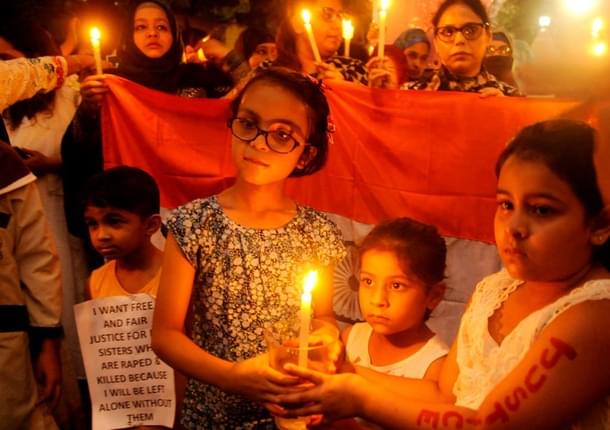Ideas
#DeathForChildRapists: There Is No Place In A Civilised Society For People Who Commit Such Heinous Crimes
Shivraj Singh Chouhan
Apr 22, 2018, 01:00 PM | Updated 01:00 PM IST
Save & read from anywhere!
Bookmark stories for easy access on any device or the Swarajya app.


In the wake of increasing brutal incidents on minors across the country, the Union Cabinet, in a landmark move, has cleared an ordinance which provides for handing down capital punishment to those convicted of raping children up to 12 years of age. I have been championing for death for child rapists for a long time. Madhya Pradesh was the first state in the country to recommend such a provision in the law. On 4 December 2017, a bill on capital punishment for such criminals was unanimously passed in the winter session of Madhya Pradesh assembly with the support of the opposition parties and sent to the President for his assent. Today, my heart is filled with a sense of achievement.
Many people then criticised my decision of introducing such a bill on the pretext that it is a violation of the right to life. I firmly believe that people who commit such heinous crimes should not escape in the name of human rights. Human rights should be only for humans and not beasts, who commit a crime like rape. I have rooted for capital punishment to rapists only to ensure a safe and healthy atmosphere for women in Madhya Pradesh and elsewhere in the country. I feel rape is the worst crime that can be inflicted on a woman. It not only damages her physically but also mars her soul and psyche beyond repair.
The state of affairs in the country is such that a rape victim is often looked down upon and many a time even ostracised by the society and sometimes by her own family. The fear of social banishment either compels the victim to commit suicide or refrain from filing a police complaint. The number of victims who have the mettle to fight the accused and the society is very low. The social stigma attached to the crime and absence of strict measures against rapists has stopped women in India from being vocal about it. Of the total number of rapes reported, hardly few women manage to fight the battle until the end, and most often the accused is allowed to go scot free. This dampens the spirit and in most cases stops a victim from filing a formal complaint.
The rate of crime against women has been alarmingly high in our country and the recent incidents have shaken the conscience of all of us. In 2007, crime against women in India was recorded at 185,312. This has almost doubled to 338,954 in 2016. According to National Crime Records Bureau (NCRB) as many as 39 crimes against women were reported every hour in India in 2016, up from 21 in 2007. In the face of such a situation, I believe taking stringent measures to check crimes against women and rape in the country is overriding. Establishing some sort of deterrence was the need of the hour.
I am of the firm belief that one of the key reasons a person dares to commit such an abominable crime is due to the lack of strict punishment. To create fear and terror among rapists and to deter people from committing such a crime, amendment of the Protection of Children from Sexual Offences Act (POCSO) to include capital punishment became indispensable. Not one rapist should be allowed to roam freely in Madhya Pradesh and other parts of the country. Although the arrest of the accused gives women the confidence to report the crime, awarding death sentence to rapists will help reinforce the faith of the victims and their parents in the judicial system. I have observed that many other countries have the provision of capital punishment for rapists, with around a year-and-a-half ago Indonesia passing a new law that includes death as a maximum sentence and chemical castration.
In recent times, in some cases in Madhya Pradesh, courts have awarded death penalty to rapists. In May 2013, the district and sessions court in Bhopal awarded capital punishment to a person accused of the rape and murder of a 16-year-old girl. In 2015, two people, one in Satna district and the other in Sehore district were awarded capital punishment for raping a five-year-old and an eight-year-old girl respectively. In February 2017, the Sidhi district court awarded capital punishment to a man for raping a woman and murdering her. I firmly believe that such cases set an example for rapists and create a fear among them about the dire consequences of their action in future.
NCRB data shows that in 92 per cent of all rape cases, the rapist could be someone you know and trust. This is shocking. We need to deeply introspect where we are heading to as a society. A social movement needs to be initiated wherein we educate children about good touch and bad touch, identify such perpetrators and hand them over to the law enforcing agencies.
Safety of children is a foremost concern for all of us. I am confident that the amendments to the POCSO Act will go a long way in reducing the rate of crime and provide justice to the victims and their family members, while at the same time safeguarding their human rights.
Shivraj Singh Chouhan is the current Chief Minister of Madhya Pradesh.





